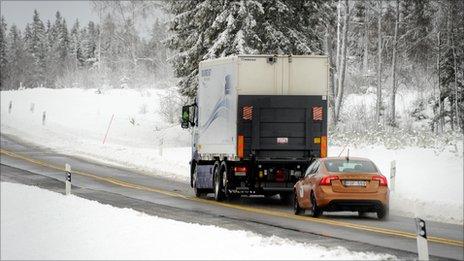'Road train' technology trials get rolling
- Published

Technology that links vehicles into "road trains" that can travel as a semi-autonomous convoy has undergone its first real world tests.
The trials held on Volvo's test track in Sweden slaved a single car to a lorry to test the platooning system.
Trains of cars under the control of a lead driver should cut fuel use, boost safety and may even cut congestion.
Project researchers believe platoons of cars could be travelling on Europe's roads within a decade.
Highway code
The road train test was carried out as part of a European Commission research project known as Sartre - Safe Road Trains for the Environment.
Video of the trial shows the test car travelling behind a lorry and then handing over control to that leading vehicle via in-car controls.
Once the lead vehicle is in charge, the driver of the car is seen taking his hands off the wheel, reading a newspaper and sipping coffee as the journey proceeds.
This is because commands to steer, speed up and slow down all come from the driver of the lead vehicle. Cars also keep an eye on their position relative to other vehicles in a platoon to ensure they keep a safe distance.
In the final system lots of cars could be slaved to a lead vehicle and travel at high speed along specific routes on motorways.
The successful test was a "major milestone" said Tom Robinson, Sartre co-ordinator at engineering firm Ricardo.
Trial participant Eric Coelingh, an engineering specialist at Volvo Cars, said: "We are very pleased to see that the various systems work so well together already the first time."
He said Sartre brought together technology from seven firms in four different countries.
The technology behind the Sartre system could be in use in a few years, however, it may take much longer for European member nations to pass laws that allow it to be widely used.
- Published9 November 2009
- Published14 January 2011
- Published9 January 2011
- Published10 October 2010